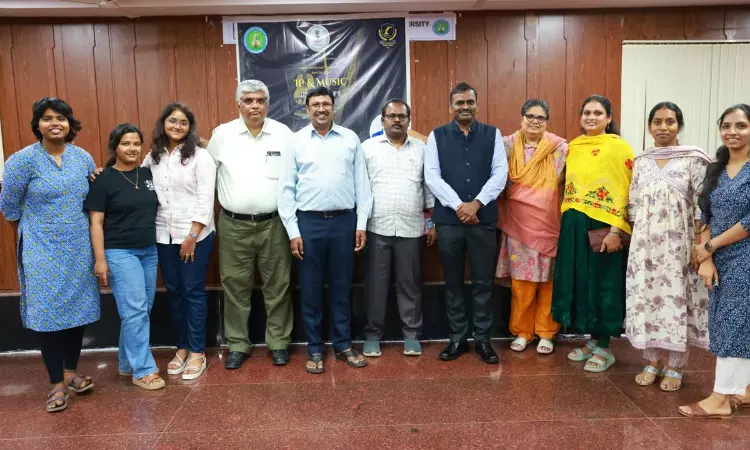DSNLU Hosts Lecture On Music And Copyright To Mark World IPR Day
LIVELAW NEWS NETWORK
30 April 2025 8:34 AM IST

On the occasion of World Intellectual Property Rights (IPR) Day, the Centre for IPR & Technology at Damodaram Sanjivayya National Law University (DSNLU) organized a lecture delivered by Professor Sakthivel from Tamil Nadu National Law University (TNNLU).
The session was presided by Prof. Dr. D Surya Prasaka Rao, Vice chancellor of DSNLU. In his Presidential address, he emphasized on the changing dynamics of IPR. He stressed upon the increasing protection required for IPR. He addressed the difficulty in enforcement of the innovative and creative work. Dr. Viswachandra Nath Madasu, the Registrar I/C, Dr. Dayananda Murthy CP, Chair Professor, DPIIT, IPR Chair, DSNLU, Faculty Convenor of CIPR&T along with the faculty members, students and staff were present on the occasion.
Professor Sakthivel delivered a thought-provoking address that explored the intersection of music and intellectual property rights. His presentation, enhanced with audio-visual excerpts from popular cinema, guided the audience through the intricacies of Karnatic music, emphasizing key elements such as raagas and sarigamapadas.
What made Professor Sakthivel's lecture particularly compelling was his ability to bridge the realms of classical music and legal rights, rendering complex concepts accessible and relatable. He underscored the role of copyrights in safeguarding the creative contributions of musicians and composers. Citing the works of the legendary composer Ilayaraja, Professor Sakthivel demonstrated that originality in music often lies not merely in creating something entirely new but in innovatively building upon traditional foundations. Ilayaraja's expertise in Karnatic music and his capacity to craft novel compositions while honoring classical traditions served as an illustration of how intellectual property rights foster and protect creative expression.
Further, Professor Sakthivel addressed challenges confronting artists, particularly with the increasing prevalence of remixes and adaptations. He elaborated on the significance of taxation and licensing frameworks in the modern music industry, emphasizing the need for mechanisms that ensure creators are duly compensated when their works are reused or adapted. His remarks underscored that copyright protection is not merely a legal requirement, but a profound recognition of the effort, emotion, and imagination invested in artistic creation.
A notable highlight of the session was the discussion of a recent copyright case involving renowned composer A.R. Rahman. The Delhi High Court directed Rahman to deposit Rs. 2 crore following allegations that his song "Veera Raja Veera" closely resembled the traditional composition "Shiva Stuti," with only minor modifications. Justice Prathiba M. Singh's observations in the case reinforced the principle that even subtle adaptations of pre-existing works must be carefully examined under copyright law. This case provided a real-world context for understanding the fine line between creative inspiration and infringement.
In an era where the music industry is becoming increasingly globalized and digitized, Professor Sakthivel's lecture served as a timely reminder of the vital role of intellectual property rights in preserving artistic integrity and encouraging innovation. Musicians, producers, and audiences alike must recognize the necessity of copyright protections to sustain a creative ecosystem.


